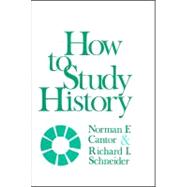We have set down in this book the basic rules and principles of historical study that a student should bear in mind as he enters upon his first college history course. In our experience as college teachers of history, we have found that students need to be informed on the nature and methods of history as a distinct intellectual discipline, and we have tried to communicate this information in as direct and practical a way as possible.
We have no only set before the college student the standards of excellence one should strive to attain in historical study; we have attempted to show, step by step, how to reach these goals. We have presented the methods and principles that appear to have the widest consensus among academic historians, and we have sought to avoid extreme and idiosyncratic opinions.









